
In today's fast-paced digital age, businesses have a wide range of messaging platforms to choose from when communicating with customers. Two of the most popular platforms are SMS and WhatsApp. It's important for businesses to understand the advantages and disadvantages of each so they can choose the best option for their needs. In this article, we'll explore the key differences between SMS and WhatsApp and help businesses determine which platform is most suitable. So, let's dive into the world of SMS vs WhatsApp!
SMS vs WhatsApp for Business: An Overview
Short Message Service or SMS is a text messaging service that allows users to send and receive short text messages on their mobile phones. SMS functionality is typically available on both Android and iOS devices.
There are no specific prerequisites or requirements for using SMS, although users will need a mobile phone with a valid phone number and service plan to send and receive messages.
SMS was first launched in the 1980s and has been widely used ever since, being a popular form of text message for cellphone users worldwide. However, it has since been replaced or supplemented by instant messaging apps like WhatsApp.
WhatsApp is a messaging application that allows users to send and receive text messages and voice messages, make voice and video calls, share media and documents, and much more. It was first launched in 2009 and has since become one of the most widely used messaging apps in the world, with over 2.24 billion active users as of 2023.
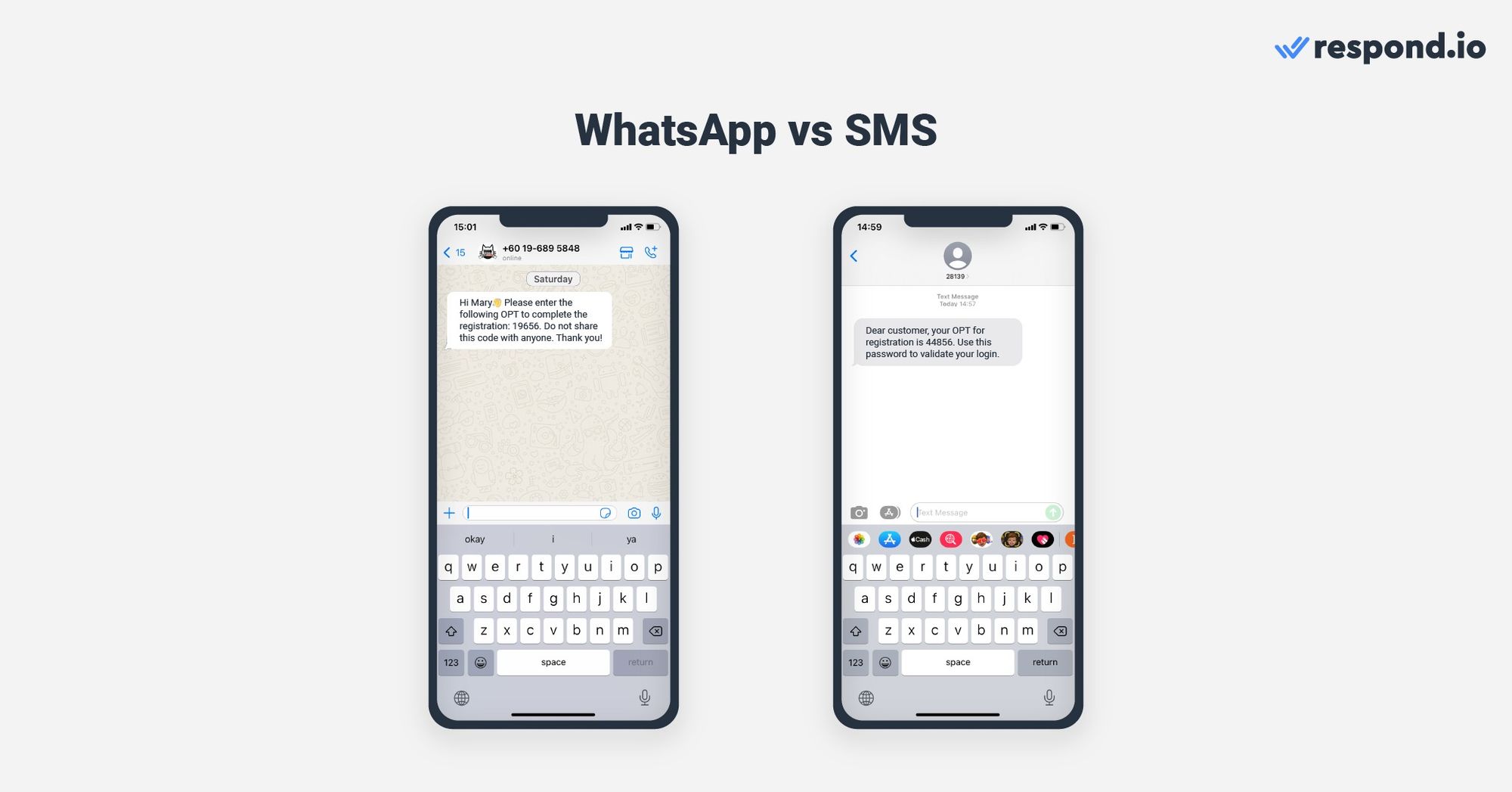
WhatsApp is available in most countries worldwide, with a handful of exceptions. To use WhatsApp, users need a mobile phone with a valid phone number and internet connection.
While the WhatsApp App is ideal for personal communication, there are specific products for businesses. WhatsApp Business App is a free, standalone app designed for small businesses to communicate with customers directly through the app.
In contrast, WhatsApp API is a tool for larger businesses to integrate WhatsApp messaging into their existing software. Messaging through SMS and WhatsApp API has some similarities and plenty of differences, which we will discuss in the next section.
SMS vs WhatsApp for Business: Main Differences
We’ve previously explained the differences between instant messaging and traditional messaging channels. In this section, we’ll compare SMS and WhatsApp for business use for initiating or handling a high volume of conversations. Therefore, we’ll be referring specifically to WhatsApp API.
SMS vs WhatsApp: Engagement
Due to its conversational nature, WhatsApp tends to create better customer engagement than SMS. While SMS messaging is often one-way and involves limited interaction, WhatsApp’s conversational nature allows for less-formal, faster interactions.
This has two important benefits. Firstly, WhatsApp’s interactive approach helps build trust and rapport between the customer and the business, leading to greater customer satisfaction and loyalty.
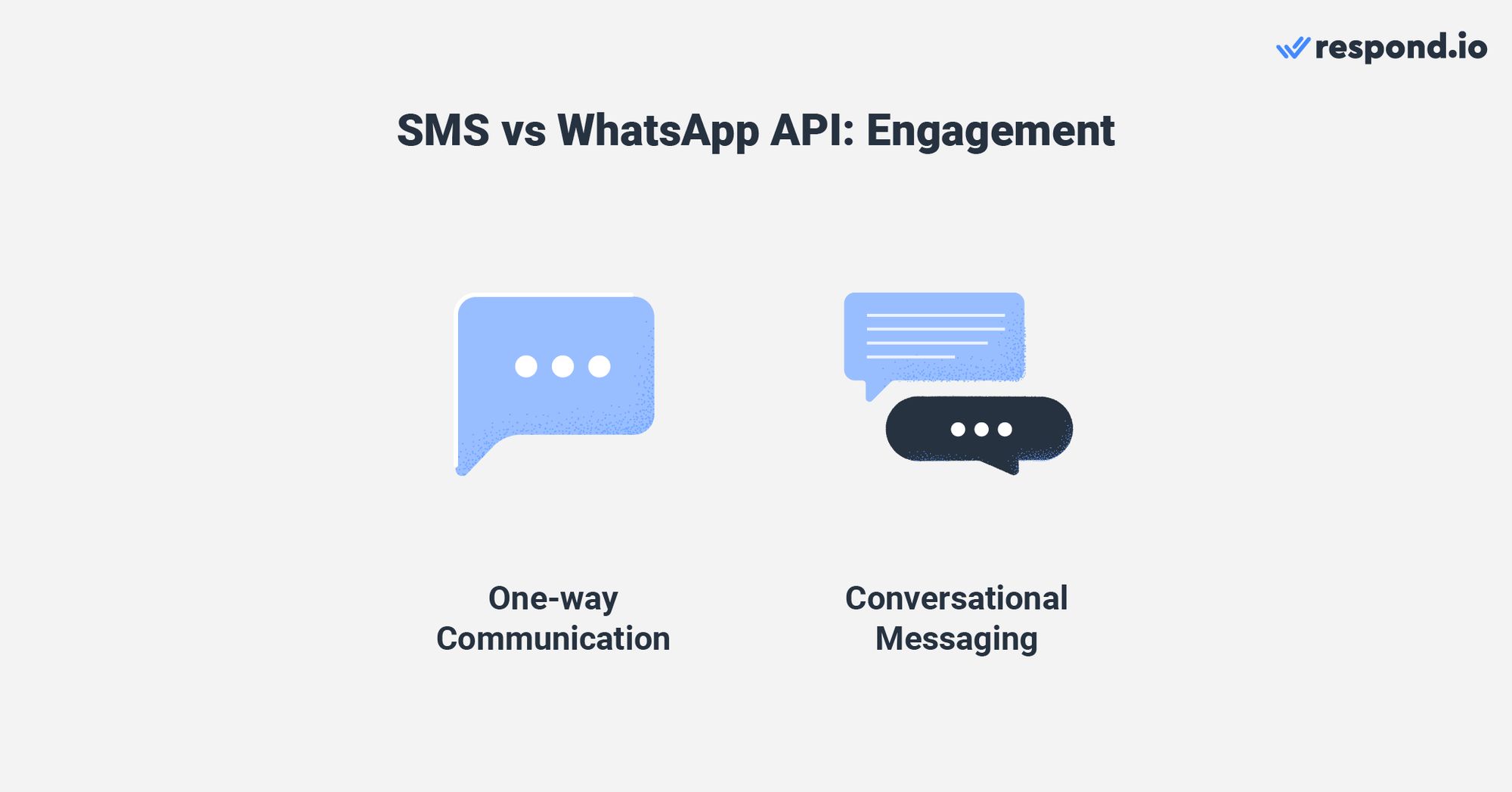
Secondly, since both parties spend less time waiting for responses, conversation resolution times are shorter. As a consequence, agents are able to close conversations quickly, increasing their efficiency.
Customers benefit from this too as they don’t like to wait a long time for responses. While engagement is important, your messaging channel of choice should include features to make customer communication easier.
SMS vs WhatsApp: Messaging Features
While SMS messages are limited to text, WhatsApp supports multimedia messages, including images, videos, audio and files, adding flexibility to the way businesses and customers communicate.
This is also useful for bulk messaging, as businesses can share a catalog or a promotional video to a segmented audience over WhatsApp, for example. For this reason, WhatsApp broadcasts or WhatsApp bulk messages offer a higher engagement rate compared to SMS broadcasts.
Some customers fall victim to scammers who message them impersonating a business.
While this is harder to prevent for SMS users, WhatsApp API users can claim authenticity by acquiring the WhatsApp green tick — provided that they meet the requirements.
Through WhatsApp API, businesses can also set up interactive responses to customer-initiated messages and interactive template messages to make customer communication more efficient, saving agents time.
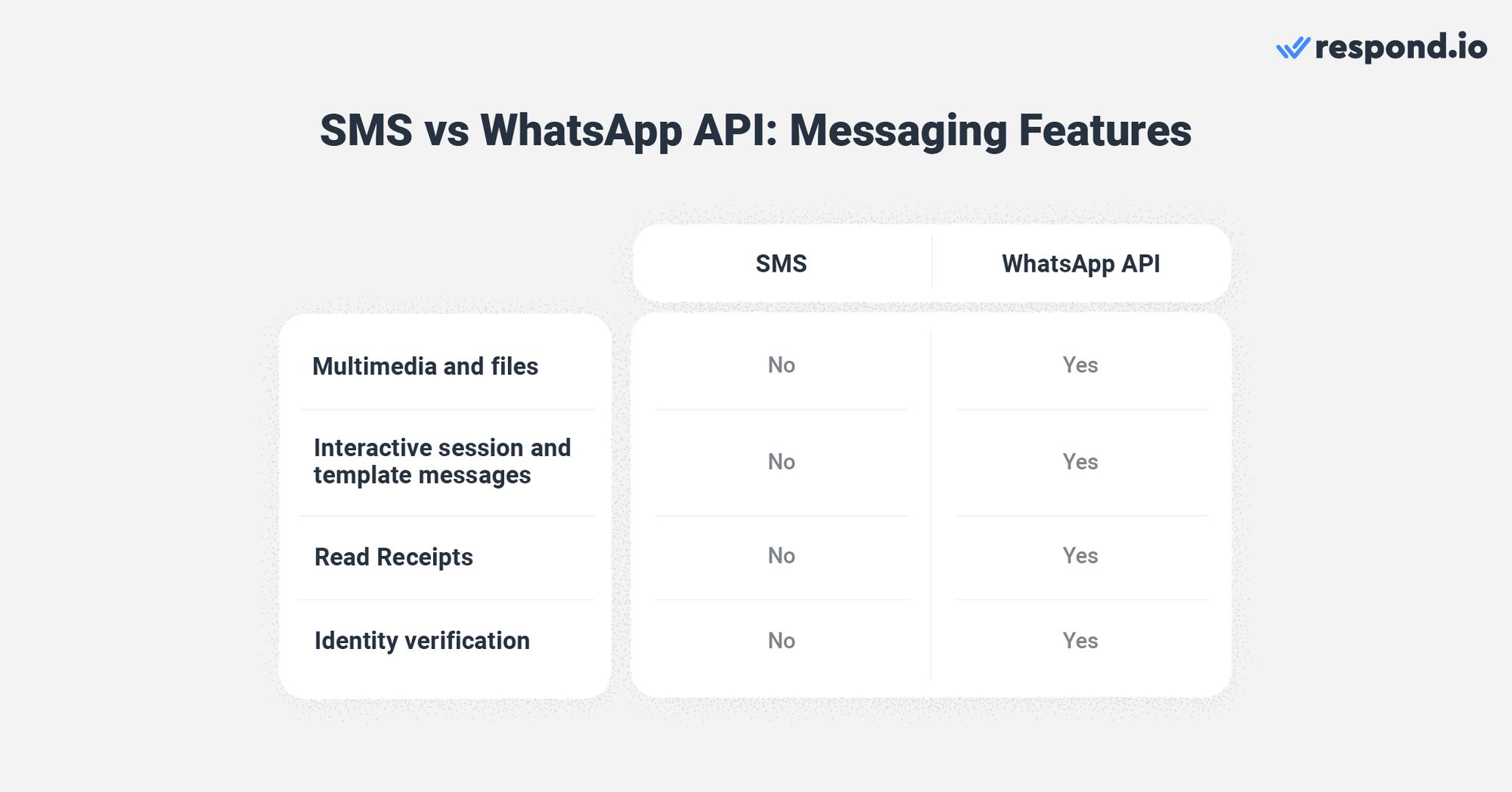
There is no way to know whether SMS recipients have read your messages or not. WhatsApp, on the other hand, provides received and read receipts to let agents know if they should re-engage with the customer or let things be.
When it comes to security, WhatsApp provides end-to-end encryption, which means that messages are encrypted before being sent and can only be decrypted by the recipient.
In addition, WhatsApp uses two-factor authentication to help protect user accounts from unauthorized access. Unfortunately, SMS messages are not encrypted, which means that anyone with access to the network can intercept and read the messages.
In the business messaging world, there are always messaging restrictions to protect users from receiving unwanted messages. For that reason, be sure to choose a messaging channel that is not too stringent with its messaging rules.
SMS vs WhatsApp: Limitations
To begin with, SMS caps messages at 160 characters. That figure looks a bit disappointing when compared to WhatsApp's 65,536 character limit.
That’s not all; using a single emoji can reduce the character limit of a standard SMS from 160 to 70. SMSes exceeding that limit will be broken down into separate messages with additional costs involved.
Unlike WhatsApp, SMS does not support images or any rich content. You’d have to use MMS for that purpose, which is more expensive. Depending on the SMS number in question, you’ll face different restrictions, meaning that there is no clear winner for businesses.
SMS notifications may also be subject to carrier filtering, which stops them from being forwarded to the recipient. It is often difficult to determine with certainty whether an SMS notification has been filtered or not.
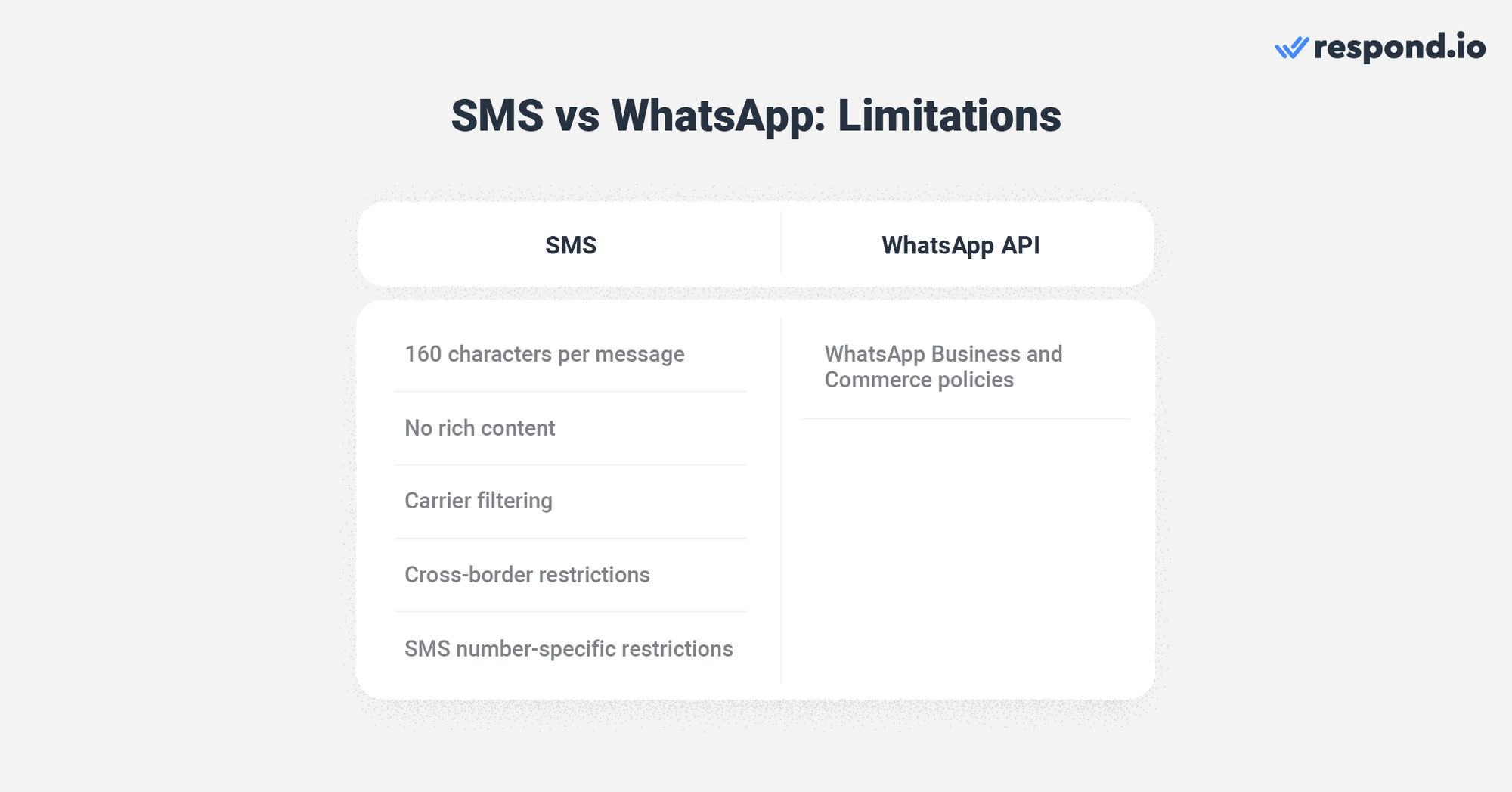
Due to cross-border restrictions, it is possible that SMS notifications may not reach overseas customers. What’s more, short code numbers only allow you to deliver notifications locally.
Alphanumeric IDs can’t receive customer replies and long codes aren’t allowed to send marketing SMS in some countries. None of these restrictions apply to WhatsApp, which additionally, has a deliverability rate of nearly 100 percent.
In fact, WhatsApp messages will reach their recipients as long as you comply with the WhatsApp Business and Commerce policies.
Finally, WhatsApp opt-ins are more convenient compared to SMS opt-ins, as they don’t cost your customers money and can be collected from different platforms. SMS opt-ins require customers to send a text message with a keyword or code, with costs involved for the customer.
We’ve mentioned costs a few times so you might be wondering, is WhatsApp messaging more expensive than SMS? We answer this question in the next section.
SMS vs WhatsApp: Pricing
When it comes to pricing, SMS is generally more expensive than WhatsApp. To get started, businesses must acquire a number from an SMS provider. Certain number types don’t involve set-up fees or monthly fees.
Unfortunately, this is not the case for short codes, which are one of the preferred choices for businesses. In addition, SMS providers charge a fee per SMS or per bundle of messages. These fees tend to be higher for SMS numbers with high deliverability rates.
What about WhatsApp Business API? To get access to it, businesses must face three different costs.
WhatsApp API access
Messaging inbox costs
WhatsApp's per-message charges
To get WhatsApp API access, businesses must choose between two hosting options: WhatsApp On-premises API or WhatsApp Cloud API. The former is only available via WhatsApp partners, often involving set up fees, hosting fees and markups per message.
On the contrary, WhatsApp Cloud API can be obtained directly through Meta or through some WhatsApp partners like respond.io. It’s the preferred choice for businesses that want cost-efficient access to WhatsApp API and quicker updates on their WhatsApp Business Accounts.
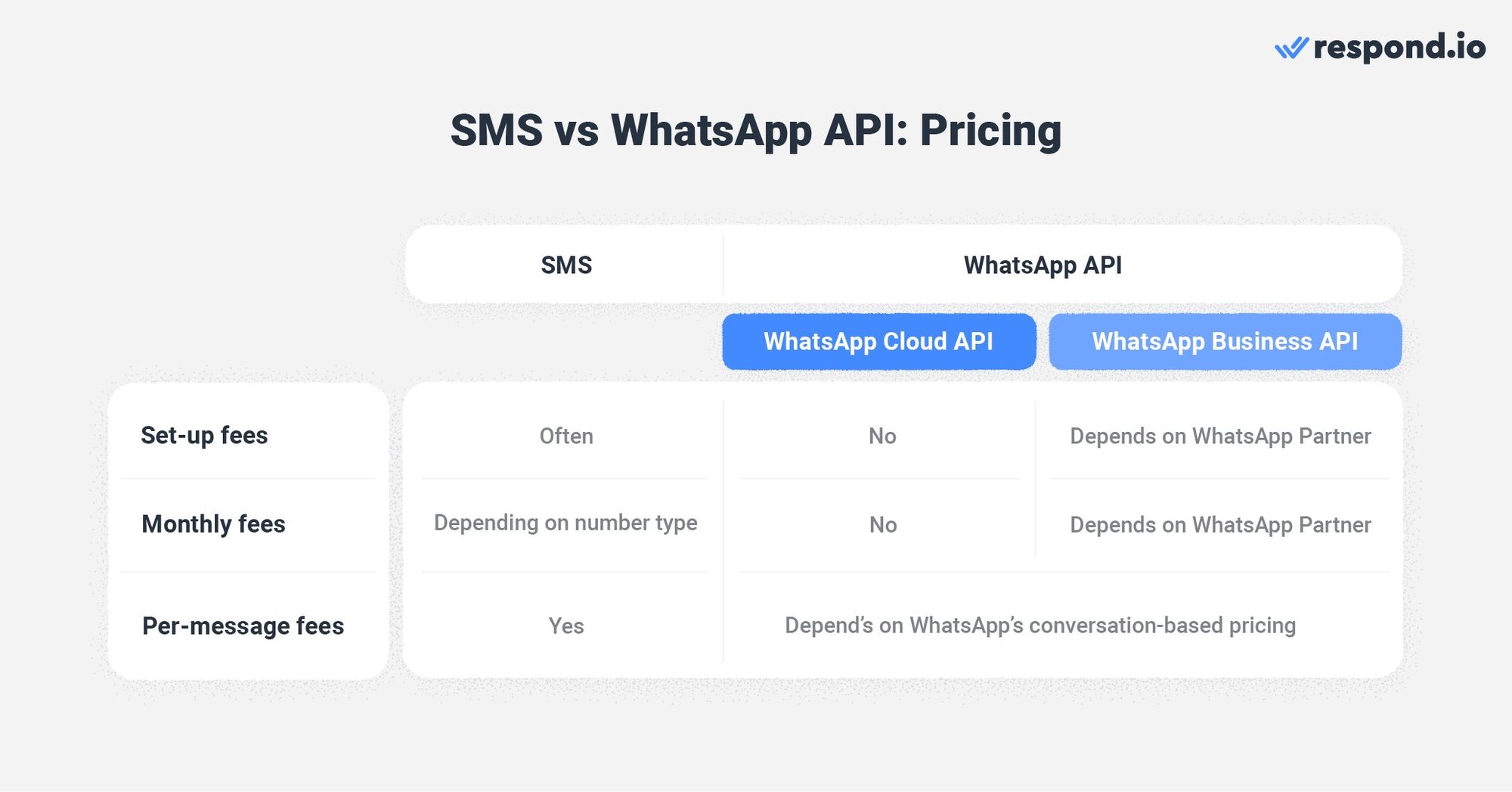
Additionally, WhatsApp charges businesses per message delivered. Costs depend on the type of message and the customer’s country code.
User-initiated messages (Service Conversations): When a customer messages you, it opens a 24-hour customer service window. During this period, replies with free-form text or utility templates are free of charge.
Business-initiated messages (Template Messages): Once the service window closes, businesses must use a pre-approved template, billed per message. Templates fall into three categories: Utility, Authentication, and Marketing — with pricing varying by category and typically highest for marketing.
Lastly, because WhatsApp API has no front end, you’ll also need a messaging inbox to receive and reply to customer messages. If you’re looking for a WhatsApp partner that offers a feature-rich messaging software, consider respond.io.
We’ve compared SMS and WhatsApp in terms of engagement, messaging features, limitations and pricing. But which messaging channel should you use for each specific business use case?
Turn conversations into customers with respond.io's official WhatsApp API ✨
Manage WhatsApp calls and chats in one place!
WhatsApp vs SMS for Notifications, Sales, Support and Marketing
SMS has traditionally been used for notifications and marketing. WhatsApp, on the other hand, has slowly established itself as a strong option for all use cases in countries where the app is popular.
In this section, we’ll break down the usefulness of both channels for notifications, sales, support and marketing.
Notifications
WhatsApp is generally considered better than SMS for sending notifications such as one-time passwords (OTPs). This is because WhatsApp provides end-to-end encryption for all messages, which ensures that they cannot be intercepted or read by anyone other than the intended recipient.
To send OTPs via WhatsApp, businesses must use the authentication message template. This template can be used for account verification, recovery and integrity challenges.
SMS, on the other hand, is more vulnerable to interception and can be subject to SMS phishing attacks, where attackers try to trick users into providing their OTP or other sensitive information.
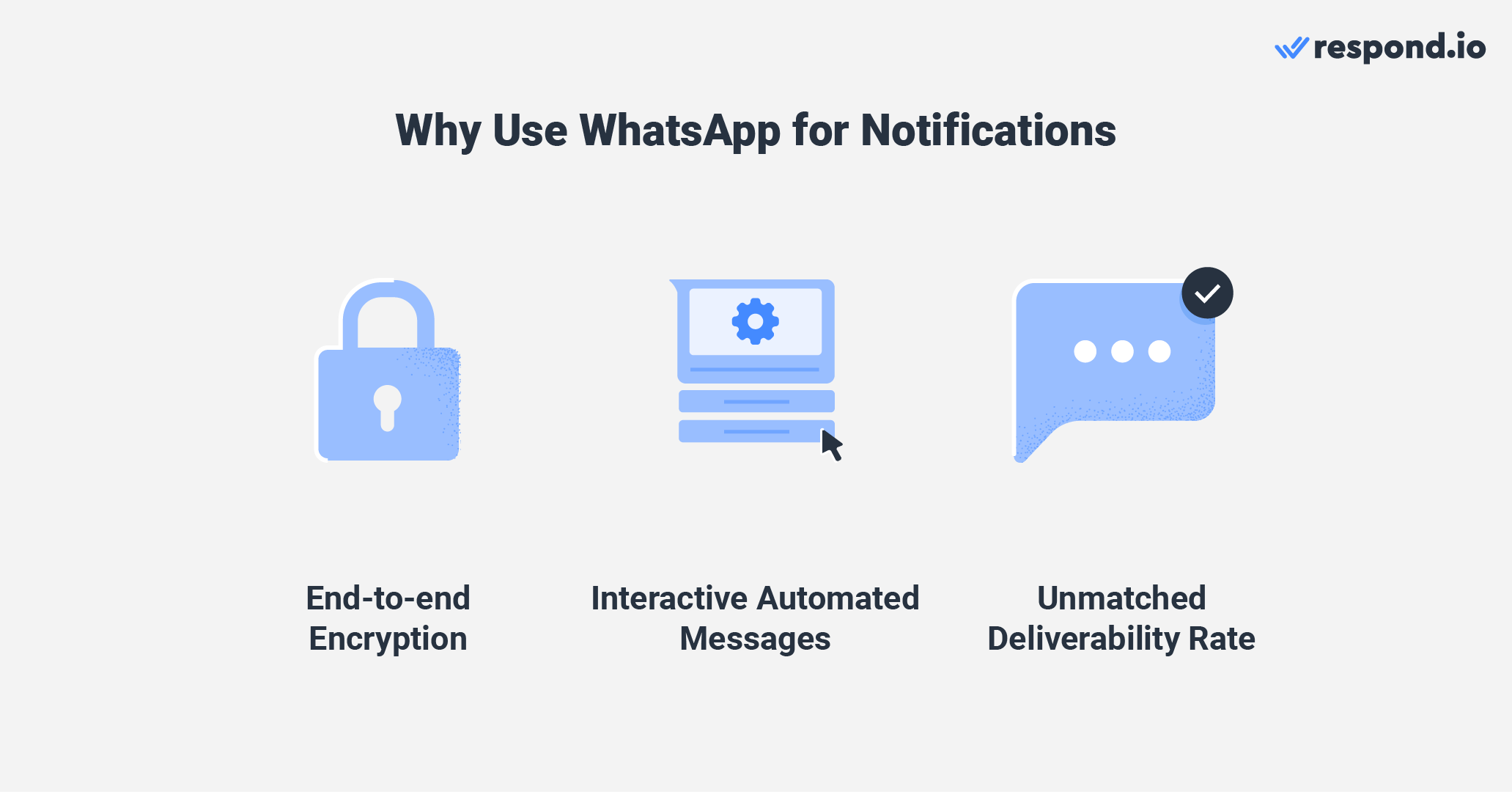
Interactive automated messages are possible with WhatsApp, but not SMS. This type of notification opens a new world of possibilities. For example, businesses can send a notification as a utility message with a menu of buttons to let customers choose between confirming a package delivery or rescheduling it.
Deliverability is critical for notifications, as these often carry important information. A message that doesn’t arrive could result in a dissatisfied customer. With WhatsApp’s high delivery rate, you can rest assured your messages will reliably arrive at their destination.
SMS notifications though, are subject to carrier filtering and cross-border restrictions, meaning that there is always a possibility that some customers won’t receive them.
Sales
SMS is not an optimal channel for sales, as it’s too impersonal and doesn’t allow for fluid conversations between a customer and a salesperson. Plus, using SMS to send messages back and forth can be costly for both parties.
Using WhatsApp for sales can offer several advantages over SMS, being a superior choice for both inbound and outbound sales. When it comes to outbound sales, agents can use WhatsApp marketing template messages for proactive sales as long as they abide by the WhatsApp template messages content rules.
For example, a real-estate agency could send property details to prospective buyers. But here’s the main differentiator: Sales agents can make use of WhatsApp’s 24-hour messaging window for template messages to freely chat with customers without incurring additional charges per message, unlike SMS.
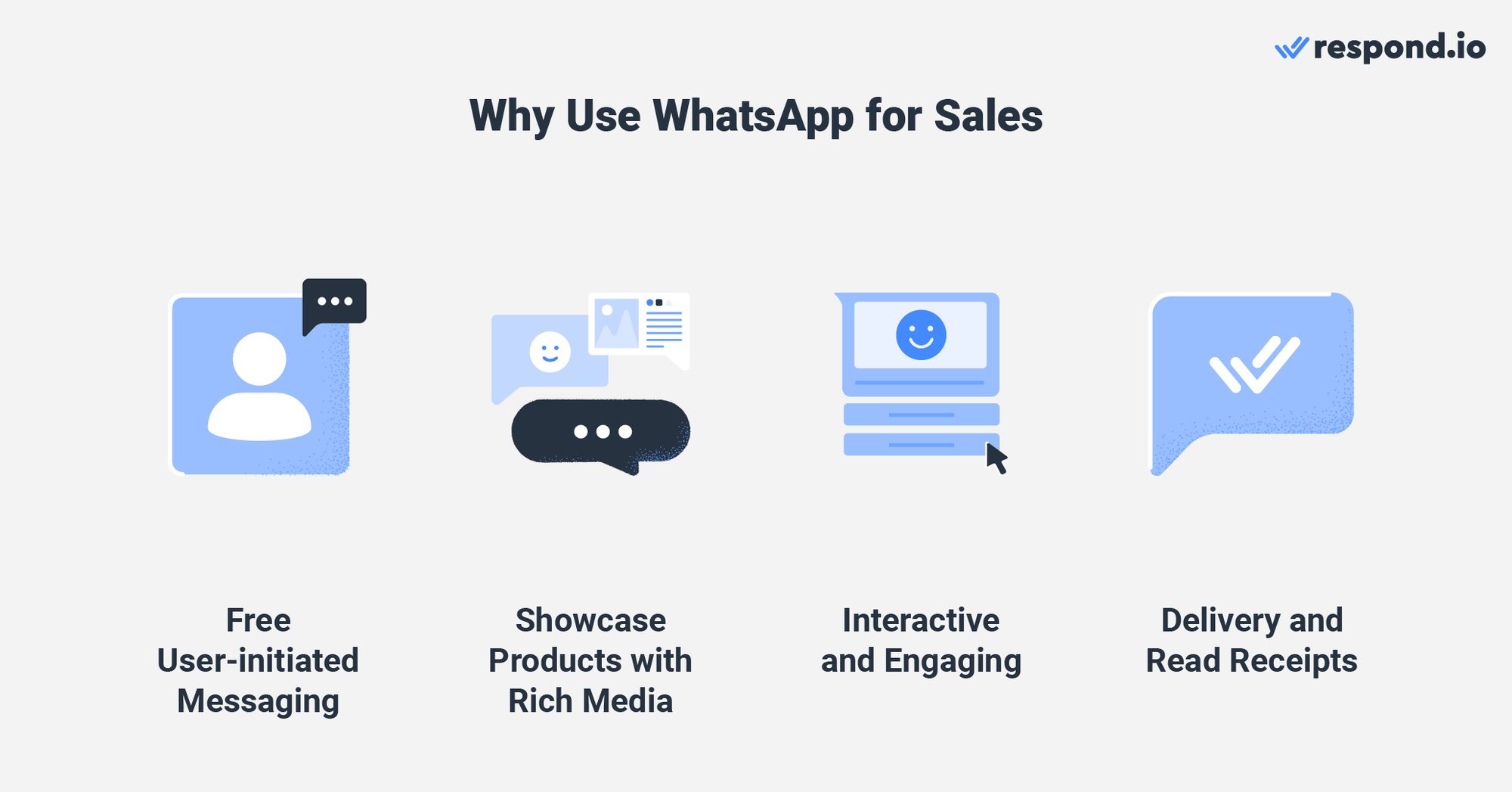
WhatsApp's rich media features help businesses showcase their products and services more effectively. This can make sales conversations more engaging and interactive, ultimately leading to higher sales conversion rates.
Thanks to WhatsApp’s conversational nature, responses tend to be quicker. As a consequence, agents can capture customers while interest is fresh.
Regarding inbound sales, WhatsApp offers your customers several additional entry points to start a conversation with your business, including chat links, QR codes and click-to-chat ads.
Delivery and read receipts on WhatsApp can also help businesses monitor the effectiveness of their sales messages and track customer engagement.
WhatsApp is also a better choice for customer support, as we’ll explain next.
Support
SMS is not a suitable channel for customer support, as conversations are too slow-paced and, generally, customers are charged per message.
WhatsApp allows for real-time, two-way communication between customers and support agents, making it easier to resolve issues quickly and efficiently. Most importantly, the 24-hour customer service window allows agents to send as many messages as required to help customers in need without breaking the bank.
Additionally, WhatsApp allows customers to send images and videos to provide context and clarify issues. This can help agents provide more accurate and effective assistance, ultimately leading to better customer experiences.
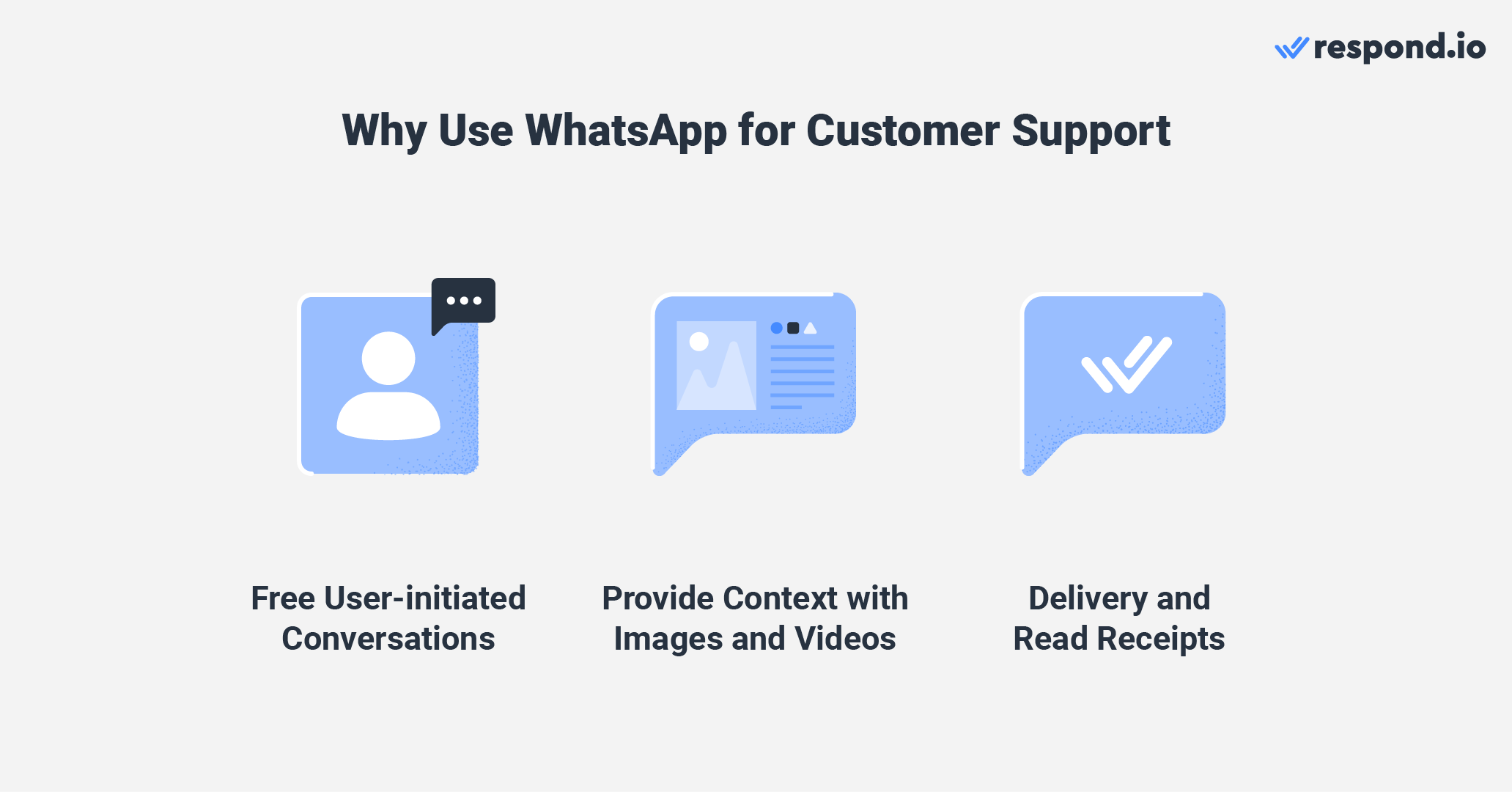
Thanks to its automation possibilities, businesses can automate most things from auto replies to interactive WhatsApp messages to create a smooth customer journey and reduce agent load.
Businesses can build very simple WhatsApp auto reply messages and WhatsApp schedule messages to quickly address customers and set expectations
FAQs are one of the most popular types of WhatsApp automation. They are often used to enable customer self-servicing. For example, a single FAQ menu can display a few buttons to answer common questions, redirect customers to a website or even route them based on their needs.
Customers can also enable WhatsApp read receipts to see when their messages have been delivered and read, providing them with more transparency and assurance that their issue is being addressed.
Let’s jump straight into the next use case. How does WhatsApp compare to SMS for marketing messages?
Marketing & Remarketing
WhatsApp broadcasts can provide several benefits over SMS broadcasts for businesses looking to reach their customers through targeted mass messaging.
One of the primary advantages of WhatsApp broadcasts is the ability to send rich media content such as images, videos and audio messages to customers. This makes marketing messages more engaging and interactive, ultimately leading to better outcomes than text-only SMS broadcasts.
WhatsApp broadcast also allows for better personalization and targeting. For example, businesses can send messages to specific audiences segmented by Contact Fields, Tags or specified conditions.
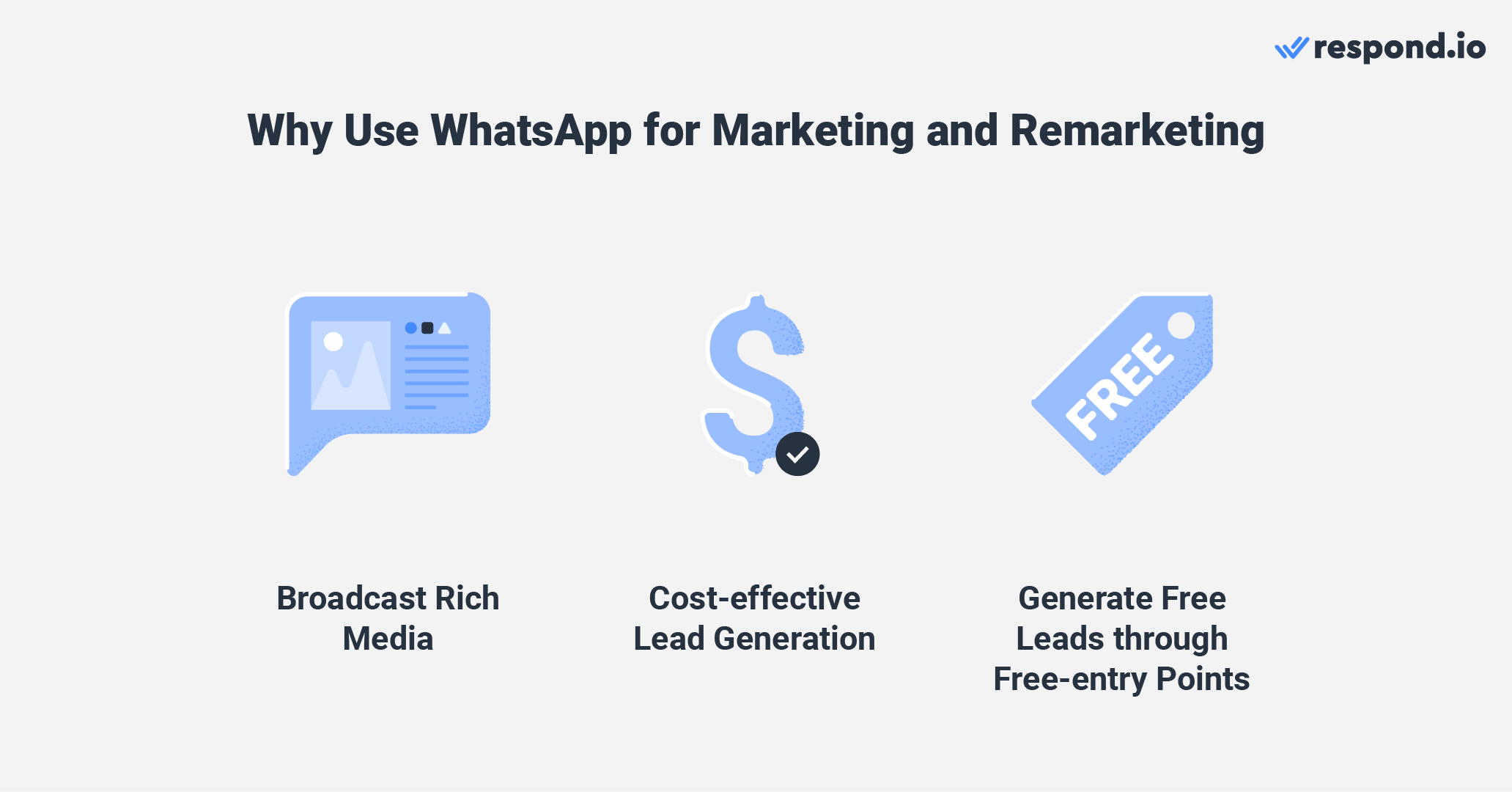
In terms of marketing costs, there is no clear winner, as this depends on factors like SMS provider or WhatsApp Partner. However, WhatsApp’s lead generation is more cost-effective.
With WhatsApp’s per-message pricing model, agents can reply to messages from customers who show interest without being charged for every single outbound message. Businesses can also save costs by generating leads via free-entry points such as WhatsApp buttons on Facebook Page at zero cost.
WhatsApp also comes with a number of tools for marketing that SMS lacks. For instance, businesses can advertise their products or services on Meta’s social media platforms like Facebook and Instagram and drive conversations to WhatsApp using WhatsApp click-to-chat ads, another free-entry point.
When customers message you via these ads, a free conversation window period is opened for 72 hours. Note that the ads themselves are not free, but simply the messages that are sent during the conversation window.
If you want to send a message outside the free entry points, you can send marketing templates that raise awareness about your brand or products, sell your products, retarget existing customers and build customer relationships.
As we reach the end of this article, there is one question left. Which one is the right choice for you?
WhatsApp vs SMS: Which One is for You?
There are still plenty of businesses using SMS. For companies that have been around for some time, it is a challenge to change from traditional communication channels to instant messaging channels like WhatsApp.
Sometimes, they are not familiar with the benefits of integrating WhatsApp as one of their customer communication channels.
However, WhatsApp is a better choice for businesses that operate in regions where WhatsApp is popular. As mentioned, it is superior in terms of pricing, engagement and messaging features, while having fewer restrictions.
Plus, WhatsApp is conversational by nature, making it suitable not only for marketing and notifications but also sales and support. Connect to respond.io to integrate your CRM and use sales and support automation.
To get started with WhatsApp for business, try respond.io for free and get your WhatsApp API account in minutes.
Turn conversations into customers with respond.io's official WhatsApp API ✨
Manage WhatsApp calls and chats in one place!
Further Reading
If you’ve found this article interesting, here are some additional readings you may like:






































 Electronics
Electronics Fashion & Apparel
Fashion & Apparel Furniture
Furniture Jewelry and Watches
Jewelry and Watches
 Afterschool Activities
Afterschool Activities Sport & Fitness
Sport & Fitness
 Beauty Center
Beauty Center Dental Clinic
Dental Clinic Medical Clinic
Medical Clinic
 Home Cleaning & Maid Services
Home Cleaning & Maid Services Photography & Videography
Photography & Videography
 Car Dealership
Car Dealership
 Travel Agency & Tour Operator
Travel Agency & Tour Operator




